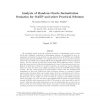78 search results - page 9 / 16 » (Convertible) Undeniable Signatures Without Random Oracles |
ESORICS
2012
Springer
11 years 11 months ago
2012
Springer
We initiate the study of unique group signature such that signatures of the same message by the same user will always have a large common component (i.e., unique identifier). It ...
PKC
2012
Springer
11 years 11 months ago
2012
Springer
ded abstract of this work will appear in Public Key Cryptography — PKC 2012. This is the full version. We propose a general framework that converts (ordinary) signature schemes ...
CRYPTO
2001
Springer
14 years 1 months ago
2001
Springer
d Abstract) Philip MacKenzie and Michael K. Reiter Bell Labs, Lucent Technologies, Murray Hill, NJ, USA We describe a means of sharing the DSA signature function, so that two parti...
ASIACRYPT
2011
Springer
12 years 8 months ago
2011
Springer
We provide constructions of (m, 1)-programmable hash functions (PHFs) for m ≥ 2. Mimicking certain programmability properties of random oracles, PHFs can, e.g., be plugged into ...
CRYPTO
2005
Springer
14 years 2 months ago
2005
Springer
We investigate several previously suggested scenarios of instantiating random oracles (ROs) with “realizable” primitives in cryptographic schemes. As candidates for such “in...

